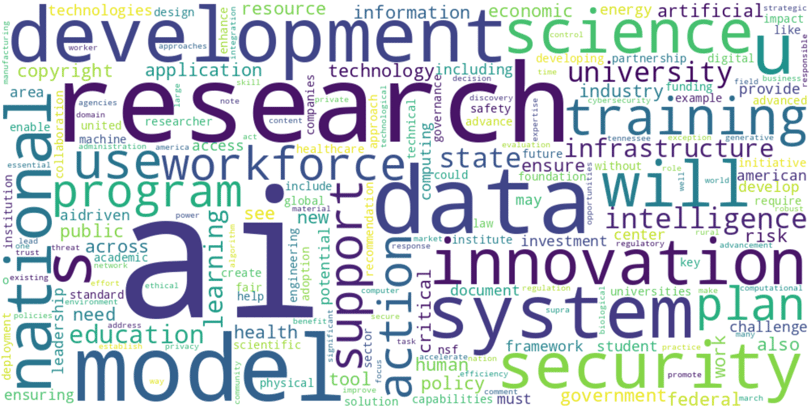Federal AI Action Plan RFI - AI Analysis of Academic Institution Responses
A deeper dive with a more detailed analysis for this category of respondents, complete with a sentiment analysis, word cloud, list of topics common across many responses, recurring themes among recommendations to the government, and any notable observations.
ARTIFICIAL INTELLIGENCE
4/27/20252 min read


Academic institutions responding to the federal AI Action Plan RFI expressed a unified and constructive vision for the future of AI in the United States. Their top priorities include robust funding and support for both basic and applied AI research, major investments in technical and human infrastructure, and the creation of flexible, adaptive policies that address issues of data governance, security, and copyright. There is strong advocacy for interdisciplinary workforce development, open access to data and models, and sustained collaboration between academia, industry, and government.
Security, copyright, and ethical responsibility are recurring concerns, but the academic sector’s overall tone is one of opportunity, leadership, and practical solutions. Universities call for bold federal action to enable innovation, advance societal benefit, and maintain American leadership in AI.
With respect to general sentiment, the prevailing tone of this group of responses was generally optimistic. Most (70%) of the responses were positive or proactive, with a focus on opportunity, leadership, solutions, and calls for support. A smaller proportion of responses (25%) were neutral or analytical, with recommendations relating to analysis of needs, or reviews of the AI landscape. Only a small number of responses (5%) expressed concerns or criticism, around topics that included security, copyright, and workforce gaps. It should be noted that discussions of these concerns were generally accompanied by recommended remedies or mitigations.
The main themes found in academic responses provide a comprehensive view of what higher education stakeholders consider most vital to effective AI governance. These issues were reflected in recurring themes among the recommendations made by this group of respondents, in relation to the academic sector’s suggested directions for federal policy and investment:
Boost federal investment in AI research, data resources, and university-based innovation.
Build and maintain robust infrastructure (computing, data, and networking).
Advance workforce training at all levels; expand interdisciplinary education and talent pipelines.
Strengthen national and global partnerships among academia, industry, and government.
Address security, privacy, and ethical issues in research and deployment.
Clarify copyright, intellectual property, and open science policies to accelerate responsible progress.
Support diverse application areas (health, energy, environment, public welfare, etc.).
A few notable findings stood out from the academic institution feedback. The topic of copyright is nearly as prominent as the terms “university” and “education,” suggesting an high value placed on this issue academic circles. AI infrastructure, technology, and models are discussed not just as technical issues, but as societal foundations. Almost all of the responses propose concrete actions—collectively, the group of academic institutions is unusually “solution-forward” when contrasted with other RFI respondent pools. And finally, there is a repeated call not simply for one-time and static regulation relating to AI, but for flexible and adaptive federal policy.
Unique Entity ID: RF8CGEK78DY4
© 2025. All rights reserved.


Navigation
#CambioMeansChange
CAGE Code: 9XEK8

